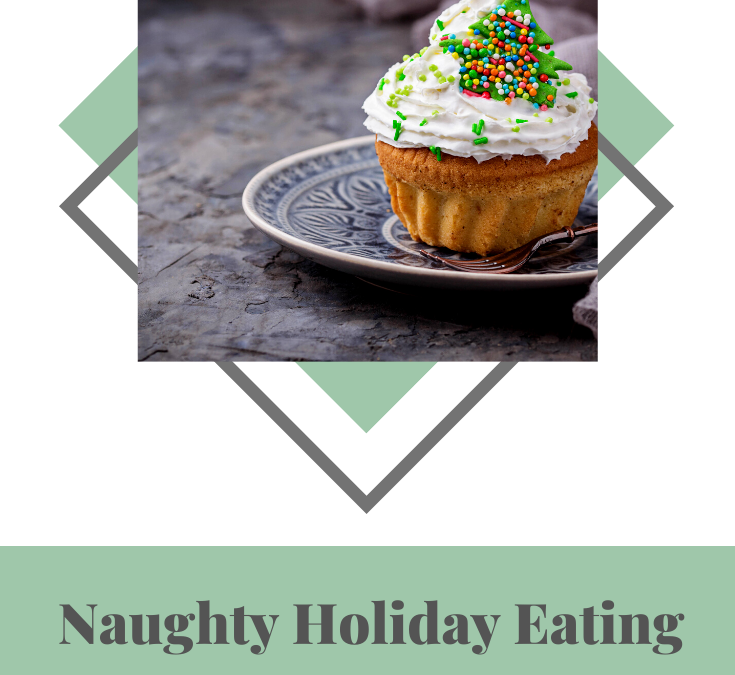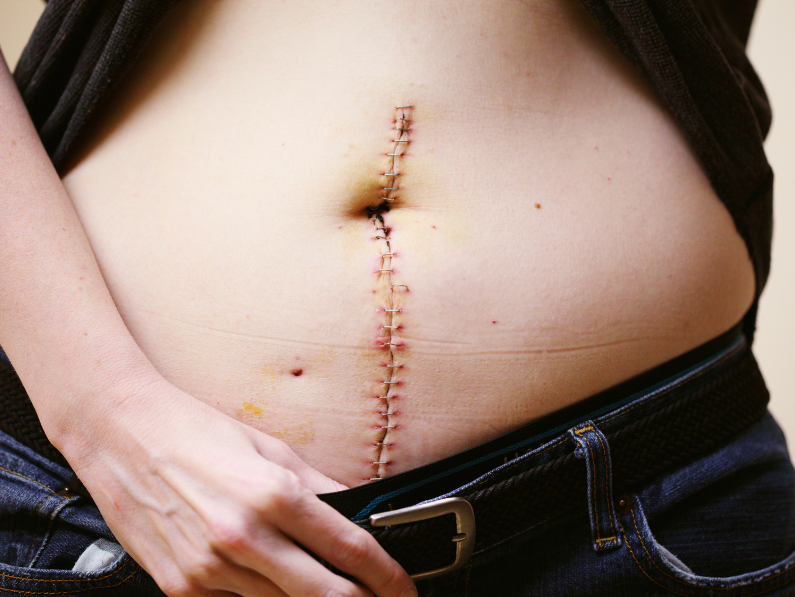When it comes to holiday eating are you naughty or nice? If you would’ve asked me this question years ago I would’ve fallen in the naughty category. I had a disastrously unhealthy relationship and mindset towards food. I was brainwashed by diet culture mentality and lifestyle. I would restrict, overeat, and repeat over and over again. But, as I abandoned diet culture and transitioned to intuitive eating and wholism I began to notice something. Such as the fact that holiday eating in some ways encourages disordered eating tendencies through unhealthy eating patterns. While simultaneously feeding into the myths fed to us by diet culture.
Page Contents
Holiday Eating and Disordered Eating
I’m not sure if you notice this but there is a large fixation placed on food during the holidays. It doesn’t matter what holiday it is. I dare you to think of one holiday where food isn’t marketed or promoted as the main focus of the celebration. And, while I’m not saying that having food as part of the holiday festivities is bad. I am saying that the mindset that we have in regard to holiday eating is questionable at best.
Let me give you an example. During the holiday season, how many times do you think, feel, or say one of the following statements?
- “I’m going to gain so much weight from eating this.”
- “I can’t stop at eating just one.”
- “I ate way too much during that party, I don’t know what happened.”
- “The holidays are all about good food and eating.”
- “It’s ok that I overeat during the holidays, I’ll start a new diet and workout plan in January.”
- “I shouldn’t be eating this but it’s the holidays so it’s ok.”

On the surface, these statements sound normal right? But, they’re not. If you take them outside of the scope of the holiday season and apply them to everyday life you could infer that the person making these statements had a poor relationship with food. What’s even more interesting is that many of these statements resemble tendencies associated with disordered eating. Some of the symptoms associated with disordered eating as outlined in the Eat Right post entitled What Is Disordered Eating? are:
- Frequent Dieting
- Food anxiety
- Meal skipping
- Chronic weight fluctuations
- Rigid rituals and routines involving food and exercise
- Experiencing guilt or shame in association with eating
- Hyperfocused on food, weight and body image to the point it interferes with the quality of life
- A rise in compulsive eating habits which may trigger binging or overconsumption of foods
- The use of exercise, food restriction, purging or fasting to make up for bad foods.
Holiday Eating and Unhealthy Habits
As you can see, disordered eating and overindulgence during the holidays share some common triggers. There are four triggers that seem to be a theme concerning holiday eating. Which are adopting food rules, emotional eating, unhealthy relationships with food, and mindless eating.
Food Rules
During the holiday season, there are parties and gatherings galore. For many, this can lead to developing some unhealthy “food rules” or “rituals” to help compensate for the fact that you’re going to be eating calorie-dense foods. For example, you may decide to fast before Christmas dinner so you can “balance out” the calories you consume. Or maybe you feel you need to have a long exercise session to “make up” for your prior day of eating. Even worse you may skip meals after a gathering or party in an attempt to compensate for overeating. And all of these approaches are wrong and unhealthy. They led to a faulty relationship with food, not to mention an unhealthy relationship with your body in general.
Fasting or skipping meals before a big meal ensures that you’re going to eat way beyond what your body needs. It’s better to eat as you normally would and then eat what you like at the event. You don’t have to gorge on food to enjoy it. You also don’t need to fast or skip meals to make up for overeating. Just get back to normal eating the next day. Your body will balance it all out. The same goes for working out to make up for what you eat. You should workout because you enjoy it and it’s part of a healthy lifestyle. Exercise shouldn’t be about punishment for what you ate. Following your normal, regular exercise regimen is enough.
Emotional Eating
The holidays can be a tough time of the year. This could be for a variety of reasons including struggling with grief over the loss of a loved one, difficult circumstances, financial strain, work commitments, or anxiety over family and holiday travel. You may find that you seek to cope with this stress by turning to food. Whether it’s purchasing extra goodies and snacks because it’s the holiday season or it’s overindulging at gatherings and parties.
Emotional eating isn’t healthy because you’re not properly dealing with what’s causing these emotions. You’re using food to cover up and hide your feelings. Finding healthy ways of coping with your stress, anxiety, grief or depression during the holidays is a better option. Get support from people that you trust, or better yet get counseling. Either way, food shouldn’t be used as a band-aid for your emotions.

Unhealthy Relationship with Food
An unhealthy relationship with food can manifest in a variety of forms. For starters, as mentioned earlier you may find that you develop food rules or rituals to compensate for overeating tendencies. Additionally, you may also begin to demonize certain foods as “good” or “bad”. Developing the habit of assigning foods good and bad connotations may lead you to over restrict in the future. Thus, contributing to the yo-yo diet cycle which is the foundation of diet culture.
I’ve personally found that these two factors play and feed off each other and indeed is the most popular unhealthy habit associated with holiday eating. The basis of this mindset is an all or nothing approach when it comes to nutrition and diet. Either, you’re completely healthy with zero “bad foods” in your diet. Or, you’re a completely unhealthy glutton with no healthy foods in your diet. Yet, strict dieting and restrictive protocols teach you nothing about proper nutrition and listening to what works for your body and your unique health. Instead, it encourages you to demonize foods except for those fleeting moments when you allow yourself to “cheat”. And, it’s on those cheat days that you go off the rails and drown in a plate of cookies. This lack of balance due to denial is why so many people become hyper-focused on food during the holidays. Because it’s the only time they’re allowed to indulge. And, this isn’t healthy since it leaves no room for balanced sensible eating.
Mindless Eating
Mindless eating is interwoven in our food culture outside of the holidays as well as within. How many meals do you eat while distracted watching a show or movie? How many times do you actually savor the food that you’re consuming? Probably not that often right. Especially during the holidays. You’re surrounded by beautifully arranged plates of delicious smelling food and your mouth waters, stomach growls and eyes bulge out of your head. You can eat everything RIGHT NOW! You pile your plate high with food and start shoveling it into your mouth until your plates empty. Now you’re stuffed. You feel bloated and heavy. But did you really enjoy what you just ate?
Taking the time to slow down and savor meals and treats during the holidays not only increase the enjoyment of what you’re eating but it helps you better determine your hunger/satiety cues. This is your body’s way of telling you “Hey, Karen we’ve had enough you can stop now.” Unfortunately during the holidays you’re so distracted by the events around you that you’re not able to truly take your time eating and enjoying your meal. Additionally, mindless eating is a common companion of emotional eating. They feed into each other since the requirement is to take your mind off of the events in your mind by consuming feel-good foods. Again, both are unhealthy practices.

Putting an End to Unhealthy Holiday Eating Habits
So, what does a healthy holiday eating look like? Well, it looks like a well-balanced approach to eating and food. This means including holiday treats and meals into your regular diet. You don’t have to choose between being healthy and enjoying the holidays. You can totally have both. What this looks like for you is going to be different and unique. Perhaps you decide to incorporate healthy alternatives to some of your holiday favorites. Or, maybe you decide against that and eat traditional dishes but do so within reason.
Whatever you choose, just know that you don’t have to go to extremes and overindulge during the holidays. You can still enjoy all this season has to offer without going off the rails and feeling guilty.
References
Eat Right: What Is Disordered Eating? by Marci Anderson, MS, RD, LDN; published October 26 2018
About the Author
 Hi, my name is Kathleen but you can call me Kat. I’m a health and wellness professional turned freelance writer and content creator. My personal struggle with infertility, endometriosis and ovarian cysts made me realize that there just isn’t enough information out there available to women to help them learn more about PCOS, endometriosis, adenomyosis, or fibroids. Basically there’s a serious lack of information concerning a variety of women’s health topics and issues and well I got fed up. I decided to be the change and created this blog in an effort to spread awareness and advocate for women’s health issues. It has now become my passion to educate and empower women to redefine their health and be their own advocate. You can find me on YouTube and Instagram. If you take the opportunity to visit me on my other platforms don’t hesitate to leave a message, I would love to hear from you!
Hi, my name is Kathleen but you can call me Kat. I’m a health and wellness professional turned freelance writer and content creator. My personal struggle with infertility, endometriosis and ovarian cysts made me realize that there just isn’t enough information out there available to women to help them learn more about PCOS, endometriosis, adenomyosis, or fibroids. Basically there’s a serious lack of information concerning a variety of women’s health topics and issues and well I got fed up. I decided to be the change and created this blog in an effort to spread awareness and advocate for women’s health issues. It has now become my passion to educate and empower women to redefine their health and be their own advocate. You can find me on YouTube and Instagram. If you take the opportunity to visit me on my other platforms don’t hesitate to leave a message, I would love to hear from you!






